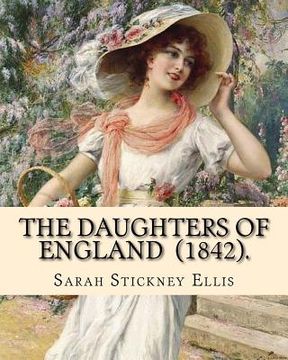The Daughters of England (1842). By: Sarah Stickney Ellis: (Original Classics) Sarah Stickney Ellis, born Sarah Stickney (1799 - 16 June 1872), also k (en Inglés)
Reseña del libro "The Daughters of England (1842). By: Sarah Stickney Ellis: (Original Classics) Sarah Stickney Ellis, born Sarah Stickney (1799 - 16 June 1872), also k (en Inglés)"
Sarah Stickney Ellis, born Sarah Stickney (1799 - 16 June 1872), also known as Sarah Ellis, was a Quaker turned Congregationalist who was the author of numerous books, mostly written about women's roles in society. She argued that it was the religious duty of women, as daughters, wives, and mothers, to provide the influence for good that would improve society. Conduct novels: Particularly well-known are The Wives of England (1843), The Women of England, The Mothers of England, and The Daughters of England, also her more directly educational works such as Rawdon House and Education of the Heart: Women's Best Work. Related to her principal literary theme of moral education for women, she established Rawdon House in Hertfordshire; a school for young ladies intended to apply the principles illustrated in her books to the "moral training, the formation of character, and in some degree the domestic duties of young ladies." Unusually for the time, the school was non-denominational and included cookery and house management in the curriculum. With few exceptions, boys and girls were educated separately in 19th-century England, and the question of how to educate women was a subject of debate. It was common for women, as well as men, to believe that the former should not be educated in the full range of subjects, but should focus on domestic skills. Elizabeth Sandford wrote for women in support of this view, whilst others such as Susanna Corder ran a novel Quaker girls' school at Abney Park instituted by the philanthropist William Allen, which dissented from convention by teaching all the latest sciences as early as the 1820s. In Education of the Heart: Women's Best Work (1869) Sarah Ellis accepted the importance of intellectual education for women as well as training in domestic duties, but stressed that because women were the earliest educators of the men who predominantly ran and decided upon education in Victorian society, women primarily needed a system of education that developed sound moral character in their offspring. Ellis aimed much of her prescriptive writing in the 1840s and 1850s at the expanding lower middle-class in the suburbs. Her readers were women who might be the first in their family to employ a domestic servant, striving to adapt to an exclusively domestic role. Understandably, historians have focused on Ellis's education of these women in domestic duties, together with appropriate submission to their husbands, in the famous phrase, to 'suffer and be still'. But there was another side to her writing. She insisted that women should remain single if they could not find a 'reasonable' husband; she was conscious of the widespread incidence of marital disharmony in middle-class marriages as women struggled to submit to husbands whom Ellis calls, ambiguously, 'the lords of creation'; and she wrote of the need for wives to 'humour', or manipulate, their husbands in their own interests and in the interests of marital harmony. In private correspondence she spoke of tensions in her own marriage with Wiliam Ellis and of friends who had left their husbands. In 1837, Sarah married the Rev. William Ellis, who held a prominent position in the London Missionary Society, and with whom she worked for the missionary cause and to promote their common interest in temperance. After thirty-five years of marriage they died within a week of each other. Of independent mind, she was buried in the countryside near their home, whilst her husband was laid to rest in the Congregationalists' non-denominational Abney Park Cemetery in the outskirts of Victorian London.

